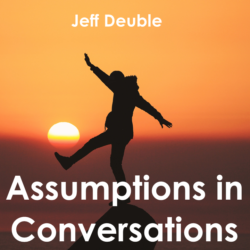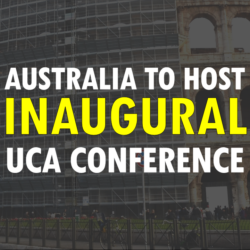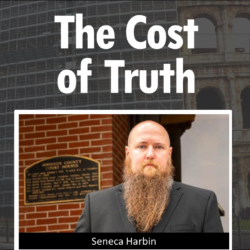Pastor Jeff Deuble of the Churches of Christ in Sydney, Australia shares his journey to uncover the genuine Jesus from scripture alone. After his brother Greg challenged him to understand Christ from a Jewish perspective, Jeff set out on a quest, reading through all of scripture to see what it really said about the Messiah. What he found upended his life, bringing both delight at his clearer understanding of Christ and heartbreak over losing the church he planted and pastored for 19 years. This is his story.

Here are some of the questions that caused Deuble to doubt the “traditional” understanding of Christ taught in the creeds:
- How can you have a singular God who is also plural? How can you explain three “persons”, who constitute one “being”?
- How can Jesus be both “fully human” and “fully God”? How does that work?
- How can Jesus be eternal, yet “begotten” by God?
- The Bible says that “God cannot be tempted” but Jesus was tempted – in fact “in every way, just as we are” (Hebrews 4 says)
- We know “God alone is immortal” and therefore unable to die (Rom 1:23; 1Tim 6:16) yet Jesus was died, and was raised to life again by the Father.
- We read that “no one has seen, or can see” God (1Tim 6:16) – that “no one has ever seen God” (Jn 1:18; 1Jn 4:12) yet Jesus was seen.
- God “knows everything” (1 Jn 3:26) yet Jesus himself admitted there were things that his Father knew that he himself did not (Mt 24:36; Mk 13:32).
- Why would “all authority in heaven and on earth” have to be given to him (Mt 28:18)? Wouldn’t this already be his by virtue of him being God?
- If Jesus is God, how can he have a God over him (Which Paul clearly states is the case on many occasions, especially in 1 Cor 15)
—— Links ——
- Leave a voice message via SpeakPipe with questions or comments
- Get in touch with Jeff Deuble via email: deublejeff@gmail.com
- Check out the interview with Greg Deuble (Jeff’s brother) They Never Told Me This in Church
- More interviews with those who studied their way out of the Trinity
- If you’d like to support Restitutio, you can donate here.
- Intro music: Good Vibes by MBB Attribution-ShareAlike 3.0 Unported (CC BY-SA 3.0) Free Download / Stream: Music promoted by Audio







I believe the effort of this philosophy to avoid the teaching of John 1, the Logos,re the eternal Christ and to replace with an adopted son fails Scripture.
No one believes in an adopted son. Did you listen to the interview? Biblically, Jesus is son of God from birth, not because he got adopted later on.
Where does John 1:1 say : ” In the beginning was the Son”; or, “In the beginning was the Messiah”, Barry ?
Yes, god created the son first….
In the beginning was the son. The son of god.
The son was there when god created everything.
Food for throught
Paul taught us to respect the honestly held opinions of other Christians, while standing firm in our own opinions. So why attack others who have tried to resolve the relationship of the persons of the Trinity, namely, the Father, Son and Holy Spirit? These are difficult matters. Questions like, “How can you have a singular God who is also plural” are designed to strike at the weakness of one attempt to explain the Trinity. However, they do not answer the issue at the heart of the matter, which is can be found in the universal acceptance of Isaiah’s prophecy of “God with us” refers to the incarnation of Jesus.
For me, there is no doubt that Jesus was born as a man, with God as his father. So that makes him the son of God. The only difficulty for us is the fact that Jesus came to understand his own divine identity, identifying himself with the Father, such as in Matt 23:37-39:
23:37 “O Jerusalem, Jerusalem, who kills the prophets and stones those sent to you, how often I have wanted to gather your children together, as a hen gathers her young under her wings, but you were unwilling. 38 Behold, your house is left desolate to you. 39 For I say to you, you will not see me again until you say, ‘Blessed is the one who comes in the name of the Lord.’”
Here Jesus is the active voice (Word) of God, despite being a human being. This is another side of the points you have raised bring out Jesus’ humanity.
In dealing with such matters, I like the formula of Cyril of Alexandria, who referred to “one person out of two natures,” while at the same time having no difficulties with the Creed of Chalcedon, bearing in mind that both statements were constructed in terms appropriate for their own times.
In my soon to be published book, Matthew and the Origins of the Gospels, I arrived at this explanation of the persons of the godhead, which seems to represent what the New Testament writers understood:
In the beginning was the Word and the Word was with God and the Word was God. When Jesus was born, he was begotten of God and the Virgin Mary and therefore the Son of God. Through his temptation experience and subsequently, he learnt to listen to God and to know quite directly God’s thoughts. Thus he was able to draw on the power of the Holy Spirit to speak God’s word throughout his ministry, therefore being the human voice delivering God’s word – the Word in action. Through Jesus’ willingness to die on the cross and his resurrection, he was lifted up to God’s throne, now personally and eternally identified with the Word of God (as in Revelation, esp. Rev. 5 and 19:13).
It is likely that this formulation has its own difficulties for some, but even so, there is no reason for Christians to divide over this issue, but rather to find ways to agree to disagree, while maintain communion with one another.
If we look at the creed that was agreed at Nicaea, at a critical moment of the Church’s history, we can see that the essential “oneness” of God was preserved against the philosophical attempts to explain Jesus’ place as belonging to a second God, who was (just) the image of the Father. The establishment of his creed was not a failure in his history of the Church, but a great victory.
We know that it is God’s plan for the Church to be instrument of God’s salvation/transformation of the world. Therefore we should not be about finding points of difference, even though Paul encouraged us to stand strongly in our own beliefs. Rather we should find ways in which Jesus’ prayer for unity among a great diversity of Christians can be realised in our own time, “that we may be one and that the world can see that we are one.”
In working towards this, Churches of Christ could give more attention to understanding the history of the Church before Alexander Campbell. Then it will be better placed to discover the ways in which God has worked (and is still working) through the Church (with all its imperfections) to achieve His purposes for mankind.
Churches of Christ was founded on the principle of bringing unity to the whole Christian Church and this is now more possible than it has been for over a thousand years. Let us not burn the chance for us to play a part in this movement. We do know that God can even raise up stones to sing the praises of Jesus, so He can do this without us if we miss the moment.
Jeffrey Deuble, I have not yet had a chance to watch your interview, but will do so when I get a chance. I think there are many Biblical reasons why you are in error. The first example is in Acts 20:28. It says “Be on guard for yourselves and for all the flock, among which the Holy Spirit has made you overseers, to shepherd the church of God which He purchased with His own blood.” (NASB). We know that God the Father is a Spirit (Jn 4:24), and we know that the Holy Spirit is a Spirit, therefore neither of them have blood. But we know that Jesus (whose name was actually Yeshua, (Iesous is the Greek transliteration mentioned in Lu 1:31) bought us with His blood (1 Cor 7:23, 1 Pet 1:19 Rev 5:9 etc). The Blood of Theos, is the Blood of Jesus. By the way, Yeshua is a contraction of Yahweh Yasha which means the Lord is Salvation, and Gabriel told Mary to name the Messiah Yeshua because He will save (sozo) His people from their sins (Matt 1:21).
It seems like the text that is being used for support of your application Joel has textual issues with it and only a confidence reading at level ‘C’ in the Critical Text. It does seem like a stretch to make this correlation and interpretation to support a Greek Gnostic Philosophical Anthropological Dualistic notion that the Father is not ‘the only true God’ [Jn 17.3b] but that God is some triune being much like the Egyptian god Ra. Certainly as your support texts so state the Apostle Peter thought it was the Messiah’s blood as did the Apostle John in the Revelation text think it was the Lamb’s blood. Neither Apostle thought it was God’s blood or so stated such. Jeffrey’s journey to his monotheistic understanding took many years and I am sure he has dealt with these texts and many others as well; please do follow the full interview. Certainly the meaning of our Master’s name has not been hidden to most of us monotheists.
Good job
.I am from similar background. I am a Stoneite not a Campellite.The local church here in Oklahoma,is severally Campbellite.Will let you know what happens in the few weeks.
Enjoyed Jeff’s journey. Went through a similar journey within the Evangelical Free Ch of America. The final result was could no longer formally minister in an EFreeCh but was not defrocked. I am retired now at age 75 years and have found no local fellowship since my one faith brother moved to Delaware recently. My DMin is from TEDS [Trinity Evangelical Divinity School] and my ThM for DTS [Dallas Theological Seminary]. My career ministries were as a US Navy Chaplain and as a State of Connecticut Correctional Chaplain having formally retired from both careers. Since Theology is systematic it was a correct biblical Anthropology that ultimately freed me for it clearly does not allow a Trinitarian take on Scripture for there is no support for Greek Philosophical Gnostic Dualism which is an anthropological must to even contemplate this false doctrine delineated in the creeds.